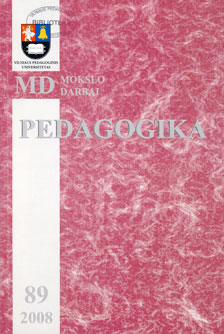Šeimotyros kaip dalyko poveikis studentų matrimonialinėms nuostatoms
The impact of family studies on students' matrimonial attitudes
Author(s): Juozas Vytautas UzdilaSubject(s): Education
Published by: Vytauto Didžiojo Universitetas
Keywords: attitude; matrimonial attitudes and behaviour; value; maxim; imperative; the relief of value system; the effect of training on students' matrimonial attitudes
Summary/Abstract: The university curricula stress their effect on the students' attitudes, abilities and competences. However, a positive impact of the subject taught on the students is an exceptional case, as the researched sources show. This also concerns family studies. In the fall term of 2007 at Vilnius pedagogical university a new subject was introduced to the students of social education "Family Investigation and Consultation" which enabled one to view the Lithuanian family in the context of demographic and social changes. The subject under consideration provides an opportunity to investigate the students' marital attitudes which are undoubtedly affected by it. After they had listened to a sixteen-hour course, the students were assigned a task to think of five maxims (subjective rules of behaviour) which they themselves will base their marriage on. These attitudes, which here are called matrimonial (marital), revealed the students' self-determination to marry for love and foster such values as self-sacrifice, respect, concord. Our students' attitudes, which were only adequate, were set off against the maladies of contemporary Lithuanians: cohabitation, life without religion, life in discord which end in separation, divorce, childlessness etc. The students' attitudes were evaluated according to the ten parameters which most correspond to the stages of marital life: premarital friendship, civil and religious marriage that is based on love, childbearing and upbringing, children's leaving their parents' home, the parents' old age. The students were most concerned with the first three stages. Their attitudes demonstrate their youthful maximalism, romantic flight that springs from the freedom of choice. The state of freedom as a possibility to reflect on the ideas of ideality relies on one's value system. Therefore the students' marital (matrimonial) attitudes convey spiritual values - love, self-sacrifice, faithfulness, respect, mutual understanding, concord, care of people, responsibility etc. Other attitudes, such as procreation (the number of children they are going to have), childrens' upbringing, the arrangement of their dwelling-place (the majority think of having their own living-place), the financial status (security) of the family are also based on the spiritual rudiment in the family. They believe that if the family life is grounded on love, harmony and trust, theirs will be a nice, well-off family who will raise good children. There were also manifestations of conformism among the students of the evening department who although had their cohabitants, argued for the priority of marrying for love. This must have resulted from the impact of the subject upon the students' thinking, their value system, and a far lesser effect on their way of life that cannot be changed now. The analysis and summing up of the students' matrimonial attitudes will help perfect the subject "Family Investigation and Consultation" and modernize the teaching process.
Journal: Pedagogika
- Issue Year: 2008
- Issue No: 89
- Page Range: 151-160
- Page Count: 10
- Language: Lithuanian

